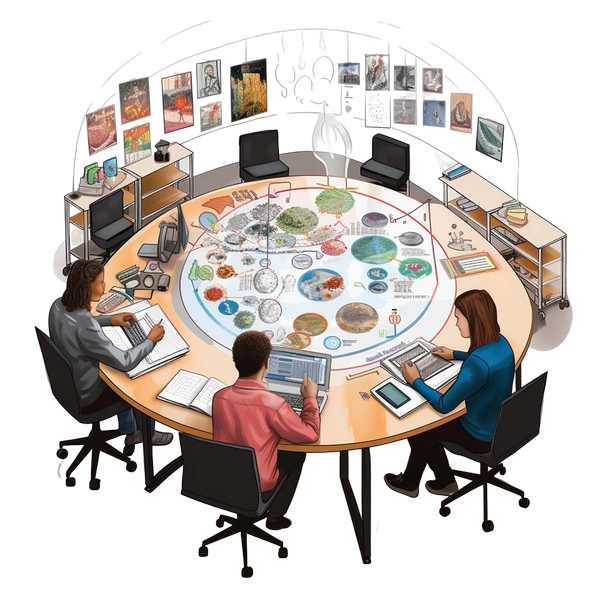Choosing the right career can feel overwhelming, given the endless advice and countless options available today. Understanding how to choose the right path is crucial, considering you would spend a huge chunk of your waking hours at work. However, things get much simpler when you realize that choosing a career is more a process of self-discovery than listening to friends and family. With your own experiences, skills, and aspirations to guide you, you can easily choose a career that’s right for you.
In this blog, we’ll give you practical, science-backed strategies to discover the career of your dreams. Ready? Let’s get started.
What is a Career Path?
A career path represents the roles or positions you take as you progress in your professional journey. A career path can include vertical as well as lateral movements, including in other departments or specializations than the one you originally started with. Whether you’re a fresher or have a few years of experience, your career path is largely determined by the skills and competencies you develop over time.
How to Choose a Career Path
Identify your skills and interests
Research shows that people are happier and more fulfilled in careers that align with personal interests. Consider the hobbies or interests you enjoy in your spare time. These can often indicate that you have an inclination towards certain careers. For example, an interest in reading could indicate a possible interest in communications, research, or editing. Also, consider any clubs or social activities you’re part of or environmental causes you may be interested in.
Pro-Tip: Ask your friends and family for their opinion on what they see as your strengths. They can provide first-hand insights that can help you determine how to choose a career path you’d like.


Identify your personality type
Your choice of career is also influenced by your personality. Discovering your predominant personality type can go a long way in simplifying your options. For example, if you are an outgoing, extroverted person, you may be better suited to customer-facing roles like sales and marketing. On the other hand, if you are more of an introvert, you may find data analytics, IT, or science-based roles more to your liking.
Pro-Tip: Take a personality test like MBTI or the Keirsey Temperament Sorter for insights into the ideal career options for you. Repeat the tests at recommended intervals to identify shifts in your career preferences.
Research industries that align with your skills and personality
Next, take a sheet of paper and divide it into two columns. Write down your skills on one side and the careers that best fit them on the other. Look up the industries where your skills are most in demand. Check the ‘day in the life’ videos and interviews on YouTube to experience what it’s like to be in one or more careers. Visualize yourself going through the same routines and experiences. If you’re excited about the prospect of working in a similar role, you’re on the right track.
Pro Tip: Attend job fairs and career seminars to interact with professionals in your ideal fields and ask questions about how they started their career journeys. If possible, obtain a business card and ask for advice when you need it.


Assess payscale, career progression, and job trends
Now that you have evaluated some career options, it’s time to back them up with solid data. Look up the average pay scale for various career options on your list— compare starting salaries, average salary growth over the last 5 years, etc. Consider the average time it takes for you to advance from an entry-level role to a management position. This will enable you to objectively assess the trade-offs you may have to make—moving to a different city, getting another degree, getting a professional course, etc.
Shortlist your career options
Narrow down your top three career options and the roles you should be preparing for. This will simplify decision-making.


Review your education
Analyze job posts on Naukri, Indeed, or LinkedIn and compare preferred skills and qualifications for the roles you may be interested in. Identify the must-have educational qualifications, including mandatory certifications, licenses, or degrees required to progress to a manager or leadership role. Make a note of any courses you may need to take in order to break into the industry.
Pro-tip: Take online courses on Coursera, EdX, Khan Academy or Simplilearn to understand the basics. Many of these courses offer free access to graduates or students.
Get practical experience through an internship or freelance role
An internship or freelance gig can be a great way to test your assumptions about a career in real-world conditions. You get the benefit of learning on the job and being mentored by experienced professionals. Besides the learning, you have the opportunity to earn a testimonial for your LinkedIn profile, build some portfolio pieces/samples of the work you’ve done, and gain some perspective on how to choose the right career path based on your skills. The best way is to apply your skills to solve real problems.


Build soft skills by joining a professional association
Navigating your career path is much easier when you get critical feedback and support from peers—those who’ve been in your shoes, and are now living the life you dream about. For example, a professional association like Toastmasters enables interactions with professionals from different industries and hone your soft skills. Learning how to communicate effectively can give you a distinct advantage in your career.
How to Choose a Career: Navigating a Changing Job Search Landscape
Now that you have scoped out different career options, the next step is to start applying for jobs and land interviews. However, that may prove to be a challenge for people just starting out in their careers. Here are some statistics for perspective:
These trends are a sign that traditional job boards or social media channels may not be enough if you want to apply for a job or internship. You need to look for alternate options to stand a chance at getting an interview. Thankfully, a new generation of recruitment marketplaces levels the playing field for anxious job seekers and helps them gain valuable skills in the process.
Cold emails
Now that social media is saturated, you need a more direct, personalized approach to catch the attention of a company you may be interested in working for. While response rates to cold email have been low, you can greatly increase the odds of a call-back by:
Personalizing your pitch:
Research the company and identify how you can add value to their team. Reference a recent event or news relating to the company as a conversation starter.
Be specific:
Mention the role you’d like to apply for and explain why you’re interested in working with them.
Contact the right people:
Research shows that line managers and senior executives are more likely to read a cold email than simply writing to an HR mailbox. Check the company’s LinkedIn page to identify people in senior management and email them instead.


Recruitment Marketplaces:
Rather than you approaching a business, recruitment marketplaces flip the script and make companies approach you. The best recruitment marketplaces use a combination of the latest tech and deep market experience to aggregate job opportunities from employers across the country.
GroYouth, for example, curates job opportunities across job boards, social media, and employer partners in one place. As a job seeker, you can look forward to:
Career suggestions: Take our GY-SAT (Gro-Youth Self Assessment Test) to understand your strengths and weaknesses, including suggestions on the best career options based on your profile.
AI-powered job recommendations: Find jobs tailored to your experience level, skills, and education – refreshed daily.
Verified employers: Apply confidently with verified job providers
Expert advice: Get counselling and career advice from our team of experts


